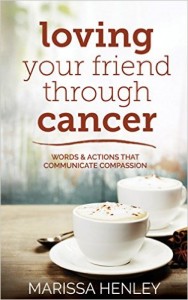By Marissa Henley, local cancer survivor and author of Loving Your Friend Through Cancer
I’ve lived through the scene several times: I sit across from a cancer survivor who recently finished treatment. We wrap our hands around our lattes and lean in close so the guy in the next booth won’t hear our discussion of post-mastectomy life.
And then she says, “Everyone around me thinks I’m better. They’ve all moved on. But I’m not okay. I need my friends to understand I’m still struggling.”
If you’re friends with a cancer survivor, she still needs you. Here are some thoughts to keep in mind as you support her through her survivorship.
1. She’s still living with cancer.
 Even when your friend hears those sweet words “no evidence of disease,” or is in remission or cured, she is still living with the physical effects of cancer.
Even when your friend hears those sweet words “no evidence of disease,” or is in remission or cured, she is still living with the physical effects of cancer.
If she’s had chemo, she may not fully recover her strength for a year. It could be even longer before her she’s truly happy with the length of her hair, and her short hair will be a constant reminder of what she’s endured.
She may be adjusting to the changes that come from surgery, especially if she’s had a mastectomy, colostomy or other life-altering surgery. Many recent cancer survivors find themselves in the operating room for follow-up reconstructive surgeries. Your friend’s body, like her medical history, may never be the same.
You can support your friend by being sensitive to her feelings, her need for rest, and the time it takes her to adjust to these changes. Be careful when you talk about your own healthy body—she may not want to hear any complaints! And if she needs follow-up surgery, show up with dinner afterwards.
2. She’s still scared.
After the physical scars heal and her energy returns, she will continue to live with the emotional changes that come with cancer survivorship.
As her friends and family celebrate the end of her treatment, she may not feel like cheering. She may struggle with grief over what she’s endured and fear about what’s to come.
The possibility of recurrence provokes anxiety in most cancer survivors. Our fear may or may not be grounded in statistics. But the fear is intense, and some days it feels like a giant cloud hanging over our entire future. Every lump, every bump, every ache or pain can be cause for concern. It feels like the line between paranoia and wisdom is impossible to find.
One way to show concern for your friend’s emotional well-being is to ask questions rather than make assumptions. Ask how she’s handling the end of treatment. Ask how holidays, birthdays and the anniversary of her diagnosis make her feel. Make sure she knows you’re still in this with her.
3. She still hates going to the doctor.
My doctors are fabulous, but I wish I never had to set foot in a medical clinic again. I can never take for granted that I’ll walk into a doctor’s office and walk out without life-changing news. Every symptom gets a follow-up test. Anything suspicious gets biopsied. I appreciate the vigilance of my doctors, but it can be stressful.
There are also medical appointments directly related to my history of cancer. The dreaded follow-ups. For some survivors, their follow-up consists of letting their oncologist know of any unusual symptoms. Some have bloodwork done regularly. I’m in the category of survivors who have scans done to check for recurrence.
These appointments are so terrifying that we’ve coined our own word for the fear: scanxiety. If you’ve never sat in a doctor’s office waiting to hear if your cancer is back, believe me—it’s as awful as you are imagining.
You can support your cancer-surviving friend by knowing her follow-up protocol. Mark the dates on your calendar, and let her know she’s in your thoughts and prayers as the day approaches. Ask how she’s coping with medical appointments and how you can support her.
4. She still needs your support and prayer.
 Some cancer survivors want to talk about their experience, spend time with other cancer survivors, and participate in cancer research fundraisers. Others want nothing to do with cancer and distance themselves from these activities. Your friend may swing between the two approaches at different times during her survivorship.
Some cancer survivors want to talk about their experience, spend time with other cancer survivors, and participate in cancer research fundraisers. Others want nothing to do with cancer and distance themselves from these activities. Your friend may swing between the two approaches at different times during her survivorship.
Remember to ask questions about her feelings and respect your friend’s choices. Support her new friendships with cancer survivors. If she attends Race for the Cure or fundraisers for her cancer type, participate with her.
And finally, keep your friend in your prayers. Cancer takes an ugly toll on the bodies, families, and futures of so many. Your friend will appreciate your continued prayers and support as she walks through the challenges of life as a survivor.
 More about Marissa: Marissa Henley, author of Loving Your Friend Through Cancer, is a follower of Christ, wife, mom, and cancer survivor who writes about faith, friendship, and cancer at www.marissahenley.com. Most days, you’ll find her drinking a latte while shuttling her three kids around in a minivan, wondering if the dog will ever learn to stay and if she’ll ever love cooking as much as her husband loves eating.
More about Marissa: Marissa Henley, author of Loving Your Friend Through Cancer, is a follower of Christ, wife, mom, and cancer survivor who writes about faith, friendship, and cancer at www.marissahenley.com. Most days, you’ll find her drinking a latte while shuttling her three kids around in a minivan, wondering if the dog will ever learn to stay and if she’ll ever love cooking as much as her husband loves eating.

